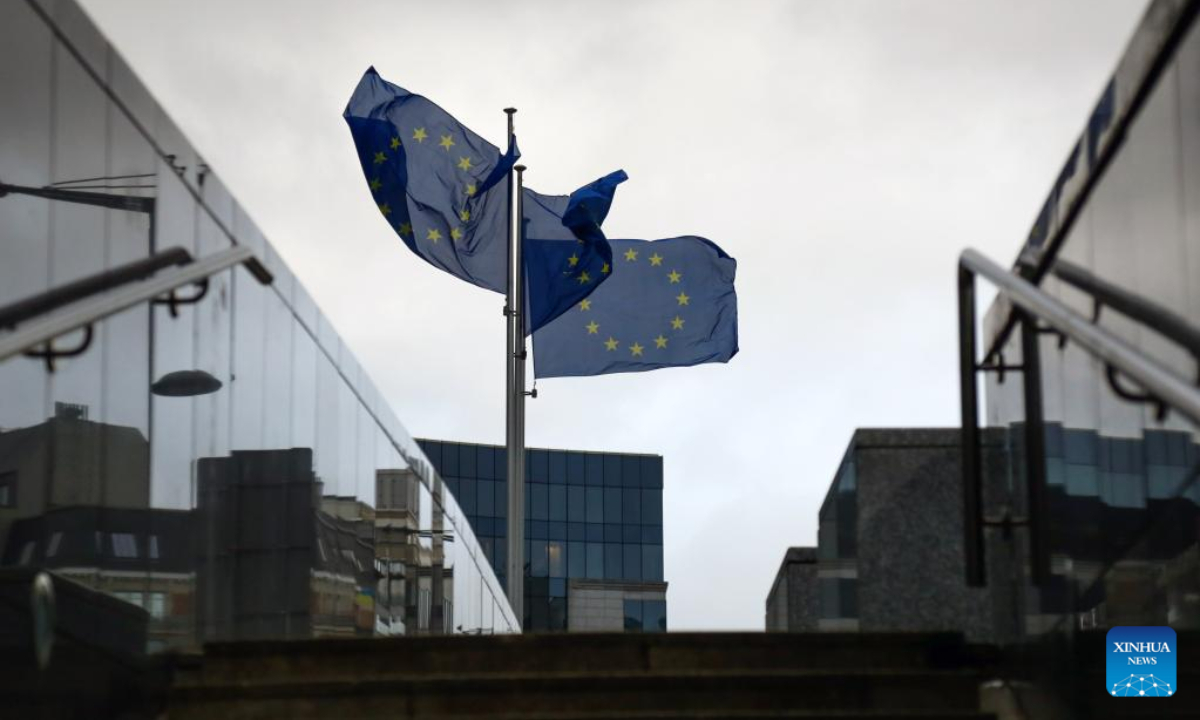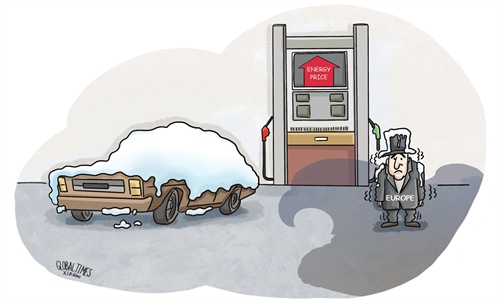
EU flags are seen outside the European Commission in Brussels, Belgium, Jan 6, 2023. Photo:Xinhua
Chinese industry representatives are concerned about the impact of EU's Foreign Subsidies Regulation (FSR), in what could be a new round of protectionism by the EU that will affect foreign companies doing business in Europe, experts said.
The regulation, which has come into effect and will officially apply in July, will cause disruption to normal business activities of competitive foreign companies, experts said, urging the EU to provide a level playing field for all market participants.
The China Chamber of Commerce to the EU (CCCEU) said on Tuesday that it had submitted feedback to the European Commission on the FSR, while expressing concerns of Chinese-funded enterprises in Europe.
The feedback said that in February, the EU Commission released the implementation draft of the FSR, which further aggravated the concerns of CCCEU and its members, according to media reports.
While there has been no clear indication of which country the regulation targets, it is widely believed it is aimed at fending off competition from China.
The FSR gives the Commission the power to investigate financial contributions granted by non-EU countries to companies engaging in an economic activity in the EU, the statement issued by the EU Commission said.
The FSR consists of three tools, including one asking companies to notify by obligation concentrations involving a financial contribution by a non-EU government where the acquired company, one of the merging parties or the joint venture generates an EU turnover of at least 500 million euros ($527 million) and the foreign financial contribution involved is more than 50 million euros.
The Commission will also investigate tenders in public procurements if the estimated contract value is at least 250 million euros and the foreign financial contribution involved is at least 4 million euros per non-EU country, according to the Commission.
Experts said that it is mainly targeting Chinese companies, given the strong competitiveness of Chinese companies in some major fields and the lingering political bias of the EU against Chinese companies.
Businesses in the fields of manufacturing such as solar panels and automobiles, in which Chinese companies have competitive advantages, would be among the first to be hit, expert said.
The implementation draft may bring a lot of uncertainty and lead to an excessive burden on enterprises, industry insiders said.
For example, the implementation draft provides little practical guidance with regard to the calculation methods and core concepts such as "foreign subsidy," causing significant legal uncertainty, the feedback from the CCCEU said, according to media reports.
A person close to a large Chinese technology company with business in the EU told the Global Times on condition of anonymity on Wednesday that they have been tracking this regulation, with how the government defines subsidies being the major concern.
"We are still studying the latest details of the regulation, with the expectation that while the most direct impact could be on state-owned companies, all Chinese companies could be affected," he said.
The current direction of Western public opinion is that no matter what problems Europe is facing, it will lay the blame for its misfortune on China, which could be the result of efforts by the US, Cui Hongjian, director of the Department of European Studies at the China Institute of International Studies, told the Global Times.
"What the EU is doing now is trying to use it as a tool to restrict other economies and ensure its industrial advantages," Cui said, adding that the EU is attempting to cover up its unfair competition behind the rules, and it also wants to use it to enhance its so-called economic sovereignty.
The FSR is a double-edged sword for EU. It may protect some so-called disadvantaged enterprises and industries in the short term, but in the long run, it is not conducive to the sustainable development of European enterprises, Cui said.
Market confidence will also be shattered as the result of the change, experts said.
"The law is a manifestation of the EU's turn toward the US to impose restrictions on Chinese investment," Huo Jianguo, vice president of the China Institute for World Trade Organization Studies, told the Global Times in a recent interview.
Huo said that trade protectionism and blocking of normal market business behavior will damage European companies.
In response to the EU's move, the Chinese Mission to the EU previously stated that it hopes that the EU's relevant measures will abide by the basic principles of the WTO.
The Mission urged the EU not to set up new trade barriers on the grounds of subsidies, but create a good business environment for the operation of foreign-funded enterprises.


